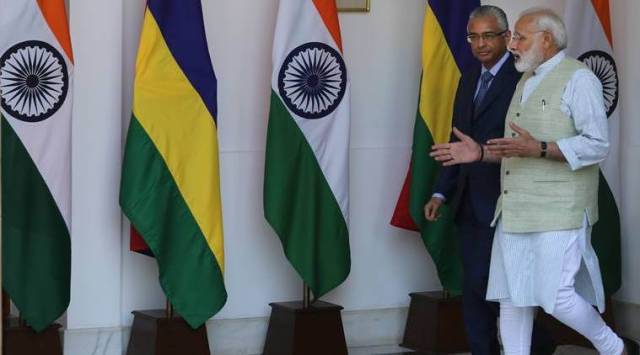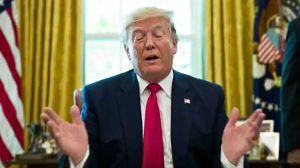Need to address challenges of safety monitoring of herbal medicines: Jugnauth
Clarifying that GCTM “will help to harness power of science to strengthen the evidence base for TM”, WHO Director General Dr Tedros Adhanom Ghebreyesus added that it also means that “India will go to the world and the world will come to India”.
 Prime Minister Narendra Modi with his Mauritius counterpart Pravind Kumar Jugnauth. (Express photo by Renuka Puri/File)
Prime Minister Narendra Modi with his Mauritius counterpart Pravind Kumar Jugnauth. (Express photo by Renuka Puri/File)Expressing optimism about opportunities that may open up with the WHO Global Centre for Traditional Medicine (GCTM) in Jamnagar, Mauritius Prime Minister Pravind Kumar Jugnauth highlighted the “need to address challenges of safety monitoring of herbal medicines” and added that Mauritius was “one of the rare countries outside India where practice of Ayurveda is truly regulated” by introducing the Ayurvedic and Other Traditional Medicines Act in 1989.
Clarifying that GCTM “will help to harness power of science to strengthen the evidence base for TM”, WHO Director General Dr Tedros Adhanom Ghebreyesus added that it also means that “India will go to the world and the world will come to India”.
Jugnauth and Tedros were speaking at the groundbreaking ceremony of WHO GCTM at Jamnagar in the presence of Prime Minister Narendra Modi on the dais along with ambassadors and diplomats from around 25 countries in the audience.
While acknowledging that traditional medicine is the first call of treatment for millions across the world, Tedros said, “When it comes to how these products are identified, developed and tested and how the benefits are shared with the communities, there is still much work to be done. Today marks a critical step in helping to bring the promise of traditional medicine to fruition for the benefit of people around the globe.”
Other challenges according to Dr Tedros pertain to “regulatory issues such as lack of systematic data and evidence, insufficient financial support for research and not enough mechanisms to monitor the safety of traditional medicine practice”.
Highlighting modern medicine’s roots in TM, Tedros added, “The discovery of aspirin drew from TM formulation, including the bark of willow tree, child cancer treatment have been based on the Rosy Periwinkle and the Noble Prize winning research on malaria control medicine started with ancient Chinese medicine. WHO’s Covid research database has over 2,500 citations of TM and TM publications are among the top five most downloaded on the WHO website.”
Thanking PM Modi specifically for “associating Mauritius with this very important event”, Jugnauth said that while use of herbal medicines are still prevalent, “we have reached a critical moment in the use of herbal medicinal products”.
“In view of the significance of natural products and traditional medicines, measures have to be taken to protect public health and address challenges associated with effective monitoring safety of all herbal medicines,” Jugnauth said.
Expressing hope at the set up of GCTM at an “opportune moment”, Jugnauth laid down his expectations of the centre of making formulations, research and policies for “safe, cost effective and equitable use of traditional medicine”.
Both Tedros and Jugnauth reminisced their long association with TM through India, with Tedros stating that he was introduced to TM by Indian teachers, adding that thus the setting up of GCTM is “no councidence”. Listing Mauritius’ long association with TM and India, Jugnauth recalled that the practice of Indian TM in Mauritius started in 1834 “with our (Mauritian) forefathers who arrived from India as the first indentured immigrants”.
Jugnauth also expressed his gratitude to Ayurved University in Jamnagar for providing scholarships to young Mauritian students doing bachelors’ degree programme in the 1990s.
Promising Mauritius’ commitment to work with WHO and “partner countries like India” for furthering TM, Jugnauth said, “In March 2015, our countries (India and Mauritius) signed a memorandum of understanding for strengthening of cooperation in the field of traditional medicine and homeopathy…Significant groundwork has been completed…and I’m pleased to announce that the Ayush centre of excellence will be constructed on 12 acres of land in the centre of Mauritius with the support of India.”







